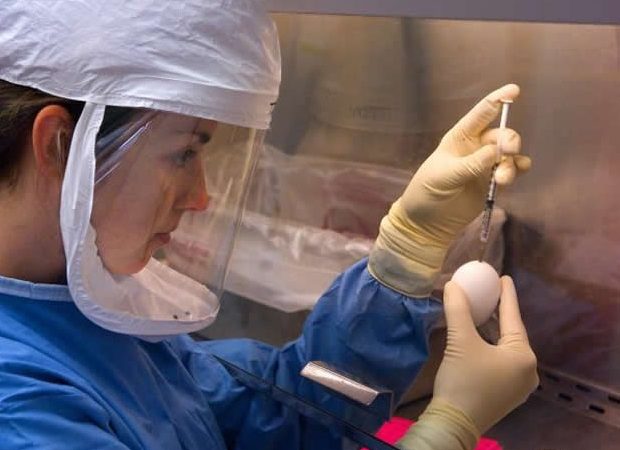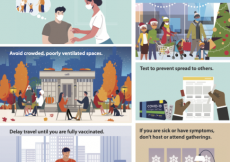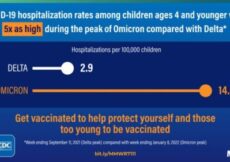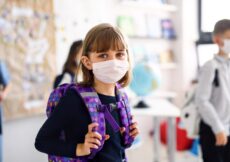Columbia researchers found that babies born during the pandemic’s first year scored lower on a developmental screening test of social and motor skills at 6 months-;regardless of whether their mothers had COVID during pregnancy-;compared to babies born just before the pandemic.
The study, which included 255 babies born at a NewYork-Presbyterian’s Morgan Stanley Children’s Hospital and Allen Hospital between March and December 2020, was published in the journal JAMA Pediatrics.
Infants born to mothers who have viral infections during pregnancy have a higher risk of neurodevelopmental deficits, so we thought we would find some changes in the neurodevelopment of babies whose mothers had COVID during pregnancy.”
Dani Dumitriu, MD, PhD, assistant professor of pediatrics and psychiatry at Columbia University Vagelos College of Physicians and Surgeons and lead investigator of the study
“We were surprised to find absolutely no signal suggesting that exposure to COVID while in utero was linked to neurodevelopmental deficits. Rather, being in the womb of a mother experiencing the pandemic was associated with slightly lower scores in areas such as motor and social skills, though not in others, such as communication or problem-solving skills. The results suggest that the huge amount of stress felt by pregnant mothers during these unprecedented times may have played a role.”
“These were not large differences, meaning we did not see a higher rate of actual developmental delays in our sample of a few hundred babies, just small shifts in average scores between the groups,” Dumitriu says. “But these small shifts warrant careful attention because at the population level, they can have a significant public health impact. We know this from other pandemics and natural disasters.”
Developmental trajectory of infants begins early
When the first wave of COVID hit New York City in early 2020, Dumitriu led a group of pediatric researchers at Columbia University Irving Medical Center and NewYork-Presbyterian in organizing studies investigating the impact of the virus on infants through the COVID-19 Mother Baby Outcomes (COMBO) Initiative.
In one early study, the researchers discovered that mothers do not pass the COVID virus to their fetus. However, it is known that viral illnesses during pregnancy increase the risk of neurodevelopmental delays in children through activation of the mother’s immune system, which in turn affects fetal brain development.
“The developmental trajectory of an infant begins before birth,” says Dumitriu, who is a pediatrician in the Well Baby Nursery at NewYork-Presbyterian Morgan Stanley Children’s Hospital. “With potentially millions of infants who may have been exposed to COVID in utero, and even more mothers just living through the stress of the pandemic, there is a critical need to understand the neurodevelopmental effects of the pandemic on future generations.”
In the current study, the researchers analyzed responses from a questionnaire that pediatricians give to parents to evaluate aspects of infant development, such as communication and fine and gross motor, problem-solving, and social skills.
Nearly half of the mothers in the study had COVID at some point during their pregnancies, though most of the illnesses were mild or asymptomatic.
No differences were found in scores between infants who were exposed to COVID in utero and those born during the pandemic whose mothers did not contract COVID during pregnancy. However, average scores among infants born during the pandemic-;whether their mothers had COVID during pregnancy or not-;were lower than the gross motor, fine motor, and social skills of 62 pre-pandemic infants born at the same hospitals.
“We want parents to know that the findings in our small study do not necessarily mean that this generation will be impaired later in life,” Dumitriu says. “This is still a very early developmental stage with lots of opportunities to intervene and get these babies onto the right developmental trajectory.”
Could COVID-related stress affect brain development?
Though the study did not measure maternal stress during pregnancy, Dumitriu says it’s possible that the stress caused by the pandemic and experienced by the mothers during pregnancy explains the drop in motor and social skills found in babies born during the pandemic.
Previous studies have shown that maternal stress in the earliest stages of pregnancy has a bigger effect on socioemotional functioning in infants than stress later in pregnancy, and a similar trend was found in the new study: Infants whose mothers were in the first trimester of pregnancy at the height of the pandemic had the lowest neurodevelopment scores.
Other factors, including fewer play dates and altered interactions with stressed caregivers, may help explain why babies born during the pandemic have weaker social and motor skills than babies born before the pandemic.
The researchers will continue to follow these infants in long-term studies.
Source:
Columbia University Irving Medical Center
Journal reference:
Shuffrey, L.C., et al. (2022) Association of birth during the COVID-19 pandemic with neurodevelopmental status at 6 months in infants with and without in utero exposure to maternal SARS-CoV-2 infection. JAMA Pediatrics. doi.org/10.1001/jamapediatrics.2021.5563.



































